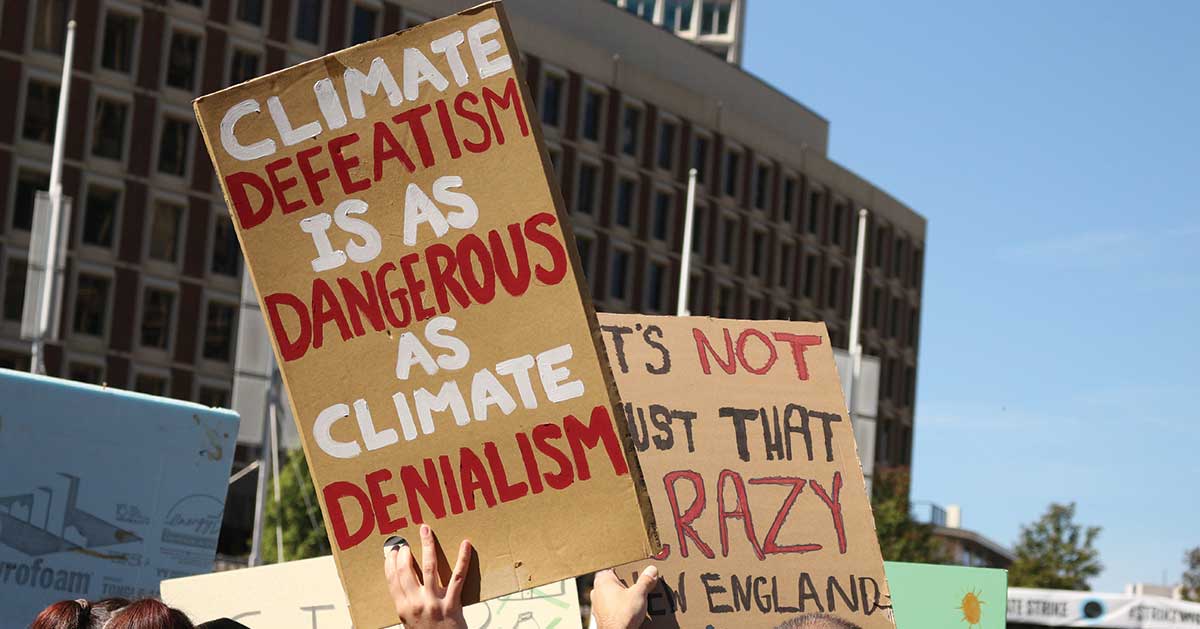Here in New England, we have accomplished the unprecedented: CLF, our partners, and our supporters have passed binding climate laws in five out of six states. These laws mandate cuts to the polluting emissions at the root of our climate crisis, targeting culpable sectors like transportation, buildings, and electricity.
Few other states have taken such aggressive action. However, passing these laws is only the first step toward reaching net zero carbon pollution by 2050. The real test of these laws – and CLF’s advocacy – is in their implementation.
Making Climate Laws a Reality
Laws by themselves are just words on paper, not action.
Each of these climate laws requires a planning process for the state to chart its path toward implementing its legal mandate. And many of our New England states have created this plan. Vermont, for example, just released its Climate Action Plan in December 2021. Maine finished its own in 2020. Massachusetts and Connecticut also have completed plans, while Rhode Island is creating its plan this year.
CLF advocates have been at the table for the creation of each of these plans, pushing for aggressive, equitable, and concrete actions. But the reality, admits Greg Cunningham, CLF’s vice president for clean energy and climate change, is that these plans are not very specific.
“We’ve found that the plans tend to be fairly high level,” he says. “They provide for categories of action rather than explicit policies that direct concrete steps to lower emissions.”
We also must contend with any plan that does not provide a timetable other than the 10-year milestone of its respective state climate law. That includes plans that lack required deadlines for action other than 2030, 2040, and 2050. Additionally, policy, regulations, and law proposals are coming from various agencies and decision-makers, presenting the risk of a highly uncoordinated effort, says Cunningham. That can all add up to a messy and procrastinated process in implementing these critical laws.
That’s why the next few years are critical for CLF’s climate advocacy. Just as we helped to lead the passing of these landmark laws – ensuring they matched the best interests of our families and communities – we must now watchdog their implementation. Because the consequences if these laws languish are too dire to be ignored.

Delays Hurt People and Our Climate
Implementing meaningful policies to meet 2030, and eventually 2050, emissions goals is critical to ensure success in the region and inspire success across the nation. Delaying implementation only means subjecting New England’s residents to worsening climate impacts.
The reality is, while climate change affects us all, it burdens some communities especially heavily, like people of color
or communities with low socioeconomic status. This is what Staci Rubin, CLF’s vice president for environmental justice, focuses on in her role: addressing environmental threats in a way that supports and uplifts those often-marginalized communities.
“Government decisions have historically not put communities first or not considered impacts to communities,” says Rubin. “So we generally see lobbying from corporate entities to achieve their best interests, not the public’s.”
We have a chance to make up for these injustices through our individual state climate laws if we center people in their strategies and actions.
“If implemented well, then climate laws will help us address a myriad of problems,” says Rubin. “And what does that mean? It means better access to public transit, cleaner air quality, improved conditions for workers. We have talked to workers who have histories of their friends and family members suffering early deaths because of their jobs servicing diesel buses, for example.”
But these benefits can only happen when we urgently implement cohesive, well-planned climate laws.
“Their implementation is not delayed everywhere and in everything,” emphasizes Rubin. “In Massachusetts, there are some really exciting components of the 2020 roadmap law underway.” However, she points to the need for continued vigilance by CLF and others. “Even despite this progress, we had to fight just to include public transportation in the Massachusetts climate plan. The first draft didn’t mention it once.”
When Delays Occur, CLF will Keep Fighting
That begs the question: How do we overcome these roadblocks to implementation?
“CLF’s role is to first be loud and vocal about what’s not working,” says Rubin. “We have existing relationships with the state agencies. So we contact them, we make suggestions, we try to work with them. We help residents get involved when public engagement is inaccessible.”
Cunningham agrees. “We deploy a lot of different approaches. They can range from collaborative conversations to petitions that compel decision-makers to move, to lawsuits when they don’t,” he says.
CLF has been here before. When Massachusetts failed to meet deadlines laid out in its 2008 Global Warming Solutions Act, CLF sued the State to force action. Our legal advocates fought the high-profile case all the way to the Massachusetts Supreme Court – and won.
“In doing all of this – in deciding the right path to take – we’re interacting with people. What solutions do they see? What works in their lives? What do they find affordable? And more and more so, we’re trying to elevate the voices that historically haven’t been heard by our policymakers,” says Cunningham.
CLF’s unique role as one of the only environmental organizations with technical expertise and local connections in every New England state is also critical to moving these laws forward. It allows our legal advocates to bring a regional perspective to the table – and to bring the voices of those who are most impacted into normally inaccessible spaces.
We cannot meet our climate laws’ mandates if we don’t begin implementing them, now. And clearly, it’s not just about meeting goals. It’s about safeguarding an equitable, livable world for our families and children. Where there are delays, CLF is ready to step up to the plate to push action or, when necessary, force it.
TRACK PROGRESS
Stay up-to-date on CLF’s work to hold states accountable to the law.
